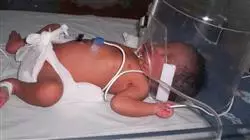University certificate
The world's largest faculty of pharmacy”
Introduction to the Program
Take the opportunity to learn about the latest advances in this field in order to apply it to your daily practice"

This program arises as a response to an important need in the field of Infectious Diseases. Today, this need responds, among other things, to the emergence of certain diseases that are unknown or have little practice (zika, chikungunya, hemorrhagic fevers, among others), and with others that have fallen into oblivion or are unknown to less experienced pharmacists such as diphtheria, measles, pertussis (whooping cough), or flaccid paralysis associated with poliovirus vaccines.
At the therapeutic level, the emergence of resistance (BLEES, MRSA, carbapenem-resistant enterobacteria, etc.), often caused by the unwise and rational use of drugs, creates problems for the clinician perform it comes to initial empirical treatment in certain situations.
On the other hand, parents who refuse vaccines, children from low-income backgrounds, infections in transplant recipients, children with devices, fevers without focus in well-vaccinated children are increasingly common situations that the pharmacist has to deal with.
All this means that, in order to provide the best possible care, the pharmacist must continuously update themselves, even if they are not a specialist, since the percentage of visits or inter-consultations related to infection is very high. If we add to this the increasing amount of information provided by parents, sometimes not always contrasted, professional updating becomes essential to be able to provide adequate information according to the current scientific evidence at all times.
With this qualification you will have the opportunity to study a program that brings together the most advanced and in-depth knowledge in the field, where a group of highly regarded professors with extensive international experience provides you with the most complete and up-to-date information on the latest advances and techniques in Diagnostic and Child and Adolescent Disease Pathology in Pediatrics.
Learn about the latest advances in Primary Care Infection and give a quality boost to your resume"
This Postgraduate diploma in Diagnosis and Treatment of Infectious Diseases in Pediatrics contains the most complete and up-to-date scientific program on the market. The most important features include:
- Clinical cases presented by experts in the different specialties
- The graphic, schematic, and practical contents with which they are created provide scientific and practical information on the disciplines that are essential for professional practice
- Developments in Diagnosis and Treatment of Infectious Diseases in Pediatrics
- An algorithm-based interactive learning system for decision-making in the clinical situations presented throughout the course
- With a special emphasis on evidence-based medicine and research methodologies in Diagnosis and Treatment of Infectious Diseases in Pediatrics
- All of this will be complemented by theoretical lessons, questions to the expert, debate forums on controversial topics, and individual reflection assignments
- Content that is accessible from any fixed or portable device with an Internet connection
This Postgraduate diploma in Diagnosis and Treatment of Infectious Diseases in Pediatrics contains the most complete and up-to-date program on the market”
It includes, in its teaching staff, health professionals belonging to the field the Diagnosis and Treatment of Infectious Diseases in Pediatrics, who bring to this program the experience of their work, in addition to recognized specialists belonging to scientific societies of reference.
Thanks to its multimedia content developed with the latest educational technology, they will allow the professional a situated and contextual learning, that is to say, a simulated environment that will provide an immersive learning programmed to prepare in real situations.
This program is designed around Problem-Based Learning, whereby the students must try to solve the different professional practice situations that arise throughout the program. For this reason, you will be assisted by an innovative, interactive video system created by renowned Pediatric and experienced experts in the field of Infectology with extensive teaching experience.

Increase your decision-making confidence by updating your knowledge with this Postgraduate diploma in Diagnosis and Treatment of Infectious Diseases in Pediatrics"
Why study at TECH?
TECH is the world’s largest online university. With an impressive catalog of more than 14,000 university programs available in 11 languages, it is positioned as a leader in employability, with a 99% job placement rate. In addition, it relies on an enormous faculty of more than 6,000 professors of the highest international renown.

Study at the world's largest online university and guarantee your professional success. The future starts at TECH”
The world’s best online university according to FORBES
The prestigious Forbes magazine, specialized in business and finance, has highlighted TECH as “the world's best online university” This is what they have recently stated in an article in their digital edition in which they echo the success story of this institution, “thanks to the academic offer it provides, the selection of its teaching staff, and an innovative learning method aimed at educating the professionals of the future”
A revolutionary study method, a cutting-edge faculty and a practical focus: the key to TECH's success.
The most complete study plans on the university scene
TECH offers the most complete study plans on the university scene, with syllabuses that cover fundamental concepts and, at the same time, the main scientific advances in their specific scientific areas. In addition, these programs are continuously being updated to guarantee students the academic vanguard and the most in-demand professional skills. In this way, the university's qualifications provide its graduates with a significant advantage to propel their careers to success.
TECH offers the most comprehensive and intensive study plans on the current university scene.
A world-class teaching staff
TECH's teaching staff is made up of more than 6,000 professors with the highest international recognition. Professors, researchers and top executives of multinational companies, including Isaiah Covington, performance coach of the Boston Celtics; Magda Romanska, principal investigator at Harvard MetaLAB; Ignacio Wistumba, chairman of the department of translational molecular pathology at MD Anderson Cancer Center; and D.W. Pine, creative director of TIME magazine, among others.
Internationally renowned experts, specialized in different branches of Health, Technology, Communication and Business, form part of the TECH faculty.
A unique learning method
TECH is the first university to use Relearning in all its programs. It is the best online learning methodology, accredited with international teaching quality certifications, provided by prestigious educational agencies. In addition, this disruptive educational model is complemented with the “Case Method”, thereby setting up a unique online teaching strategy. Innovative teaching resources are also implemented, including detailed videos, infographics and interactive summaries.
TECH combines Relearning and the Case Method in all its university programs to guarantee excellent theoretical and practical learning, studying whenever and wherever you want.
The world's largest online university
TECH is the world’s largest online university. We are the largest educational institution, with the best and widest online educational catalog, one hundred percent online and covering the vast majority of areas of knowledge. We offer a large selection of our own degrees and accredited online undergraduate and postgraduate degrees. In total, more than 14,000 university degrees, in eleven different languages, make us the largest educational largest in the world.
TECH has the world's most extensive catalog of academic and official programs, available in more than 11 languages.
Google Premier Partner
The American technology giant has awarded TECH the Google Google Premier Partner badge. This award, which is only available to 3% of the world's companies, highlights the efficient, flexible and tailored experience that this university provides to students. The recognition as a Google Premier Partner not only accredits the maximum rigor, performance and investment in TECH's digital infrastructures, but also places this university as one of the world's leading technology companies.
Google has positioned TECH in the top 3% of the world's most important technology companies by awarding it its Google Premier Partner badge.
The official online university of the NBA
TECH is the official online university of the NBA. Thanks to our agreement with the biggest league in basketball, we offer our students exclusive university programs, as well as a wide variety of educational resources focused on the business of the league and other areas of the sports industry. Each program is made up of a uniquely designed syllabus and features exceptional guest hosts: professionals with a distinguished sports background who will offer their expertise on the most relevant topics.
TECH has been selected by the NBA, the world's top basketball league, as its official online university.
The top-rated university by its students
Students have positioned TECH as the world's top-rated university on the main review websites, with a highest rating of 4.9 out of 5, obtained from more than 1,000 reviews. These results consolidate TECH as the benchmark university institution at an international level, reflecting the excellence and positive impact of its educational model.” reflecting the excellence and positive impact of its educational model.”
TECH is the world’s top-rated university by its students.
Leaders in employability
TECH has managed to become the leading university in employability. 99% of its students obtain jobs in the academic field they have studied, within one year of completing any of the university's programs. A similar number achieve immediate career enhancement. All this thanks to a study methodology that bases its effectiveness on the acquisition of practical skills, which are absolutely necessary for professional development.
99% of TECH graduates find a job within a year of completing their studies.
Postgraduate Diploma in Diagnosis and Treatment of Infectious Diseases in Pediatrics
Become an expert in the diagnosis and treatment of infectious diseases in pediatrics with TECH Global University's Postgraduate Diploma program. At TECH, we understand the importance of having trained professionals in the area of children's health, especially when it comes to infectious diseases. That is why we have developed a program of online classes specifically designed to provide you with the knowledge and skills necessary to meet this challenge. Our graduate program focuses on the study of the most common infectious diseases that affect children, such as influenza, respiratory infections, vector-borne diseases and many others. You will learn to identify symptoms, diagnose accurately and apply the most effective treatments in each case. Online classes offer a number of significant benefits. You will be able to access high-quality content from anywhere and at any time, allowing you to study at your own pace and adapt the program to your schedule and needs. In addition, you will be supported by experts in pediatrics through live interactive sessions, where you will be able to resolve your doubts and participate in online discussions with other professionals in the healthcare field.
You will be able to develop advanced skills in pediatrics through the use of the latest technology.
You develop advanced skills to find the best treatment for an infection in pediatrics
Our pharmacy faculty prides itself on having highly qualified and committed faculty who will guide you throughout your learning. You will gain up-to-date knowledge on the latest research and advances in the field of pediatric infectious diseases. Don't miss this opportunity to expand your knowledge and make a difference in the health of the little ones. Join TECH Global University's Postgraduate Diploma in Diagnosis and Treatment of Infectious Diseases in Pediatrics program and become a highly trained expert in pediatric health care.







